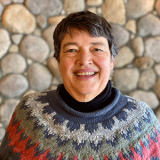Schooling the Nation: The Success of the Canterbury Academy for Black Women with Jennifer Rycenga
Join us for an engaging evening with Jennifer Rycenga as she discusses her new book, Schooling the Nation: The Success of the Canterbury Academy for Black Women where rethinks the history of the Prudence Crandall story. We will delve into the significance of centering Black women's activism and the crucial role of cross-racial coalition building in understanding abolitionist networks in the North.
About the Book:
"Founded in 1833 by white teacher Prudence Crandall, Canterbury Academy educated more than two dozen Black women during its eighteen-month existence. Racism in eastern Connecticut forced the teen students to walk a gauntlet of taunts, threats, and legal action to pursue their studies, but the school of higher learning flourished until a vigilante attack destroyed the Academy.
Jennifer Rycenga recovers a pioneering example of antiracism and Black-white cooperation. At once an inspirational and cautionary tale, Canterbury Academy succeeded thanks to far-reaching networks, alliances, and activism that placed it within Black, women’s, and abolitionist history. Rycenga focuses on the people like Sarah Harris, the Academy’s first Black student; Maria Davis, Crandall’s Black housekeeper and her early connection to the embryonic abolitionist movement; and Crandall herself. Telling their stories, she highlights the agency of Black and white women within the currents, and as a force changing those currents, in nineteenth-century America.
Insightful and provocative, Schooling the Nation tells the forgotten story of remarkable women and a collaboration across racial and gender lines." (University of Illinois Press)
Speakers

Jennifer Rycenga, author of Schooling the Nation: The Success of the Canterbury Female Academy (University of Illinois Press, 2025), is Professor Emerita in the Humanities Department at San José State University. Her scholarly work has focused on the Abolitionist movement, exploring areas previously hidden or marginalized, such as Black women’s activities and voices, the anti-racist work of white Abolitionists, and networks of families and friends involved in the struggles against slavery and injustice. In addition to her work on the Canterbury school controversy, she has led two Digital Humanities projects on the Burleigh family of Plainfield, Connecticut - seven siblings who all supported Prudence Crandall and the Canterbury school, and philosophic analyses of the work of Black speaker Maria Stewart (1803-1879).
Rycenga’s other work ranges widely across feminist musicology (co-editor with Sheila Whiteley of Queering the Popular Pitch, Routledge 2006), global feminism (Frontline Feminisms, co-edited with Marguerite Waller, Routledge 2001), and lesbian philosophy (The Mary Daly Reader, co-edited with Linda Barufaldi, New York University Press, 2017). Her next major work will examine the convergence of justice, history, and the natural world.